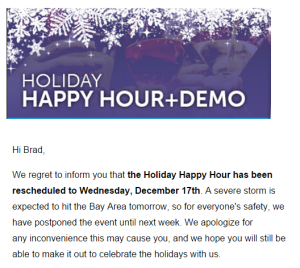Eat your own dog food. That’s a blunt way of saying a company should practice what it preaches.
These days, with high buyer skepticism and social sharing off the charts, eating your own dog food is not just a good practice; it’s a strategic imperative. Great companies focus their internal operations on living and breathing the values and practices they espouse to the outside world. But too often it doesn’t play out this way. For example, recently I spoke with a leading marketing automation company about an analytics project for one of our clients. I made it clear in this discussion that our firm, Boundless Markets, was NOT looking for any software. We were just inquiring about new ways of using analytics through the reporting in their system. The next day I received this email from the company:
“Hello Brad,
Because you have shown interest in marketing software recently, I wanted to find out if you would like some help identifying your requirements and building the business case for marketing automation. Choosing a marketing automation system isn’t a simple task, so let me know if you would like to schedule a 15 minute chat.”
In other words, a company whose entire existence is based on helping companies improve the targeting and relevancy of marketing to audiences completely ignored these principles in their own follow-up. The way these mistakes happen, even with the best automation on the planet, is typically with human error. Their representative tagged me as the wrong kind of prospect, and as a result the only automation that happened was one of irrelevancy. A few weeks later, the same company sent me the email below— a note about their holiday party in the Bay Area – and they know I’m based in New York City.

How do they know where I’m based? Well, they asked during the initial phone call. But either my address didn’t make it into their system or their holiday note did not take geography into consideration. Either way, score one for data collection, score zero for acting on that data with smart targeting, which is what their entire company presumably is all about. It is clear that this leading provider of marketing automation, a recognized “thought leader,” does not eat its own dog food. No wonder the speculation inside the industry is that this company does NOT even use its own software to automate their internal marketing processes.
Other examples of not eating your own dog food I’ve come across recently:
- A leading global management consulting firm (that helps FORTUNE 500 companies with research based insights) lacks effective processes for its own internal information gathering
- A diet supplement positioned as an alkalizer (which neutralizes harmful affects of acid in the digestive system) contains lemon juice, a very acidic ingredient
Great companies internalize and perfect the practices they trumpet—this is a powerful part of effective branding. Doing anything less can destroy a company’s credibility. Can you imagine what it takes to turn around the impression that your company does anything less than excel in areas core to your value proposition?
Take a minute to answer the following questions to see how well your company eats….err, practices what you preach.
- What values are inherent in the way my company and products are positioned, and how well does your customer experience reflect them?
- Are there well articulated, desired behaviors for employees that tie to these values?
- How is ownership for these behaviors assigned and are proper accountabilities in place?
- Do you have metrics/KPIs for these desired behaviors?
If your answer is no to any of those questions, what do you plan to do to remedy the situation? As you ponder that question, consider this quote from Shakespeare: “It is a good divine that follows his own instructions”.



